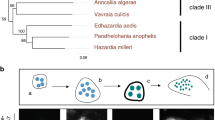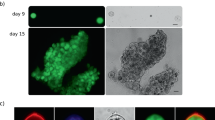Abstract
SINCE the discovery of Plasmodium berghei by Vincke and Lips1, repeated attempts have been made to infect various anopheline and culicine mosquito species with this plasmodium in the laboratory. Oocysts and sporozoites have been observed in naturally infected Anopheles dureni2; but apart from the finding on two occasions of small numbers of young oocysts in experimentally infected A. maculipennis var. atroparvus3, no sporogonic development of P. berghei under experimental conditions has hitherto been described.
This is a preview of subscription content, access via your institution
Access options
Subscribe to this journal
Receive 51 print issues and online access
$199.00 per year
only $3.90 per issue
Buy this article
- Purchase on Springer Link
- Instant access to full article PDF
Prices may be subject to local taxes which are calculated during checkout
Similar content being viewed by others
References
Vincke, I. H., and Lips, M., Ann. Soc. belge Med. trop., 28, 97 (1948).
Vincke, I. H., and Lips, M., Ann. Soc. belge Med. trop., 30, No. 6 (1950).
Rodhain, J., and Vincke, I. H., Ann. Soc. belge Med. trop., 31, 297 (1951).
Adler, S., Yoeli, M., and Zuckerman, A., Nature, 166, 571 (1950).
Author information
Authors and Affiliations
Rights and permissions
About this article
Cite this article
YOELI, M., WALL, W. Complete Sporogonic Development of Plasmodium berghei in Experimentally Infected Anopheles spp.. Nature 168, 1078–1080 (1951). https://doi.org/10.1038/1681078a0
Issue Date:
DOI: https://doi.org/10.1038/1681078a0
This article is cited by
-
A pre-emptive strike against malaria's stealthy hepatic forms
Nature Reviews Drug Discovery (2009)
-
Transmission of Plasmodium berghei (NK65 Strain) by Anopheles annulipes Walker
Nature (1970)
-
Movement of the Sporozoites of Plasmodium berghei (Vincke et Lips, 1948)
Nature (1964)
-
Cyclical Transmission of Plasmodium berghei in the Laboratory
Nature (1952)
Comments
By submitting a comment you agree to abide by our Terms and Community Guidelines. If you find something abusive or that does not comply with our terms or guidelines please flag it as inappropriate.



